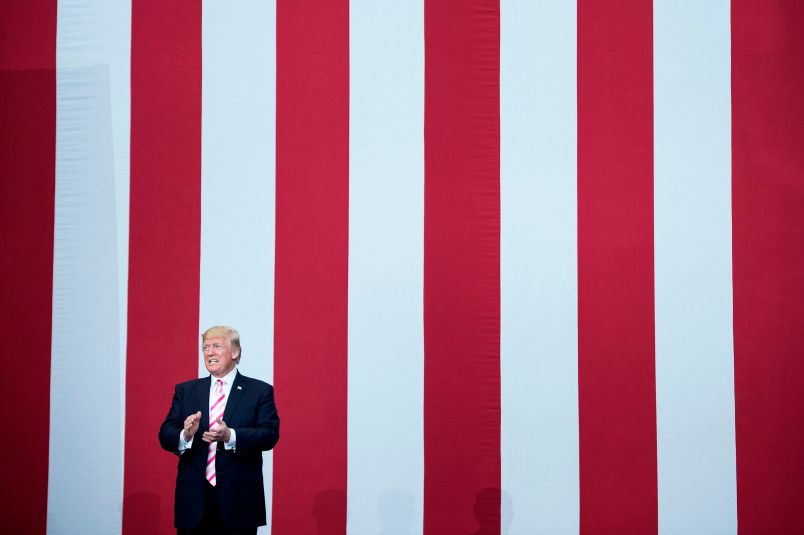This article is part of TPM Cafe, TPM’s home for opinion and news analysis.
Former President Donald Trump may see himself as a winner, but the candidates he endorses don’t always win. In fact, his endorsement often helps the opponents of his candidates.
That was true in the 2018 midterm elections, and a similar effect could happen in the upcoming 2022 midterms. One early indication: In late July, Republican and Trump endorsee Susan Wright lost to fellow Republican Jake Ellzey in the special election runoff in Texas’ 6th Congressional District.
The failure of Trump’s endorsement to propel Wright to victory has raised questions among political observers about the sway the former president has in GOP politics. The loss led to Trump’s inner circle casting about for whom to blame.
While some Trump allies were quick to point fingers at internal party divisions and Republican infighting, Trump himself blamed Democratic voters for Susan Wright’s loss.
Trump’s endorsement may have mobilized Democrats and independents, who ultimately voted for Wright’s GOP opponent, Jason Ellzey.
Our work, and the work of other political scientists, suggests that endorsement backlash frequently occurs in contemporary politics. As political scientists, we observed the prolific tweeting of President Trump and wanted to know whether his endorsements of congressional candidates affected their campaigns and the campaigns of their opponents.
We found that during the 2018 midterm elections, President Trump’s endorsements helped Republicans he endorsed raise money, but also helped their Democratic opponents raise money.
Ultimately Trump’s endorsement was more detrimental than helpful. It led to an increased vote share going to the Democratic opponent of the candidate Trump endorsed.
The ‘backlash effect’
Trump endorsed 80 different congressional candidates in the 2018 midterm elections. He tweeted 134 endorsements to 45 congressional candidates and endorsed another 35 congressional candidates at 47 in-person campaign events.
Our research looked at campaign fundraising, turnout and vote share for candidates whom Trump endorsed in the 2018 midterm elections as well as their opponents.
While presidents often campaign for and support candidates for the House and Senate in midterm elections, most of that previous activity occurred in person and at the local level rather than on Twitter or some other national platform. Previous presidents also haven’t been nearly as generous in their endorsements as Trump.
President Barack Obama, for instance, endorsed 16 congressional candidates in 2010 and eight candidates in 2014. All those endorsements were given at local events rather than on social media. While Trump has already endorsed 22 candidates leading up to the 2022 election, President Joe Biden has endorsed only two.
Trump endorsements did affect the races: Our research found that Trump-endorsed candidates raised more money from more donors immediately following the president’s endorsement.
But an endorsement from President Trump also benefited the endorsed candidate’s Democratic opponent. Democrats took advantage of Trump’s unpopularity among Democrats and independents and made sure that those voters also knew about the endorsement. And while endorsed candidates raised more money, their opponents also raised more money from more donors immediately following the president’s endorsement.
Opponents of Trump-endorsed candidates also benefited from increased mobilization at the polls.
Races with a presidential endorsement had higher turnout than comparable races without an endorsement – but that didn’t help the endorsed candidate. Instead, Trump’s 2018 endorsements decreased the endorsed candidate’s vote share by almost 2.5 percentage points compared with candidates in similar districts who did not receive Trump’s endorsement.
Without Trump’s endorsement, Republicans likely would have won control of Minnesota’s 7th Congressional District in 2018 rather than having to wait until 2020 for Republican Michelle Fischbach to defeat incumbent Democrat Collin Peterson. Likewise, without Trump’s endorsement of New Jersey Rep. Tom MacArthur in 2018, our estimates suggest he would have won reelection by about 1.2 percentage points rather than losing by 1.3 percentage points.
Ultimately, we found that Trump’s endorsements cost Republicans 16 seats – exactly 20% of the 80 candidates he endorsed. That represented 12 in the House of Representatives and four in the Senate.
Not just Trump
Other research has also shown that the engagement of national political figures at the local level appears to mobilize supporters and opponents alike.
Visits from presidential and vice presidential candidates in 2016 increased local donations both to the candidates who were visited and their opponents. Notably, Trump campaign rallies in 2016 increased donations from the local area to Hillary Clinton’s campaign more than to his own.
These findings suggest that high-profile interventions from divisive political figures ultimately may be unhelpful or, worse, damaging in the general election to the endorsed candidates. While such an endorsement does provide some benefits to the endorsed candidate, it also generates a backlash effect that can ultimately benefit an opponent.
Early indications in Trump endorsements for 2022 suggest they may be even more detrimental than in 2018. In addition to the failure of Trump’s endorsement to carry his preferred candidate to office in Texas’s 6th Congressional District recently, opponents have outspent Trump-endorsed candidates this cycle .
Given both parties’ anticipation of a hotly contested election in 2022, with control of both the House and Senate likely to be up for grabs, party leaders and candidates may want to carefully evaluate whether they need or want the help of both President Biden and former President Trump on the campaign trail. These endorsements may ultimately prompt more backlash than support.
Hans J.G. Hassell is an associate professor of Political Science at Florida State University.
Andrew Ballard is an assistant professor of Government at American University.
Michael Heseltine is a Political Science PhD. Candidate at American University School of Public Affairs.
This article is republished from The Conversation under a Creative Commons license. Read the original article.







It seems to me, then, that endorsements by He Who Shall Remain Unnamed should be encouraged.
I hope to see many such candidates become the GQP nominee in 2020!!
Anyone who is endorsed by TFG should fire up left of center voters.
Bring it on.
Trump endorses himself … and it accelerates his deterioration …